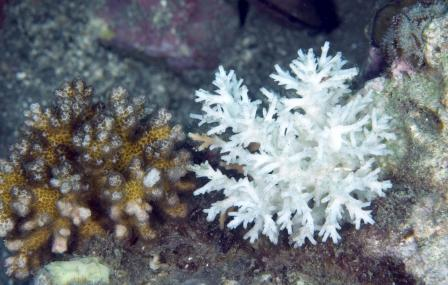By Maria Angella Fortich Fraija
Coral reefs are a large part of our marine ecosystem, they provide a large number of ecological and economic services, including protection against erosion and interactions with other ecosystems , such as mangroves in coastal areas. In addition, it is the habitat for fish, molluscs and crustaceans that, at the same time, are food for society.
polyps and corals
“ Coral reefs are being boiled alive,” says Gabriel Grimsditch of the United Nations Environment Program's division of marine ecosystems.
Coral reef ecosystems are diverse groups of species that interact with their physical environment at all times. Stony corals are characterized by having a hard skeleton, the colonies of this organism are composed of thousands of individual polyps.
Polyps are capable of extracting dissolved calcium from seawater and solidifying it into calcium carbonate which helps them to form and support the skeleton . The thin layer on the surface corresponds to living coral, the hard calcium mineral skeleton may be decades old. Coral reefs survived the extinction of the dinosaurs (big bang), the ice age, the wars of all civilizations and is battling against the current environmental crisis.
Colombia and coral reefs
The reefs Colombia has more than 180,000 hectares of corals , about 79% of them are in the San Andrés archipelago, the Rosario Islands, the San Bernardo archipelago, Providencia and Santa Catalina is where the majority are concentrated. Corals are a large part of Colombian biodiversity , they are of vital importance to regulate the fight against climate change.
Likewise, in Colombia the figures are alarming and action needs to be taken as soon as possible. In the Colombian Caribbean, the annual rate of loss of live coral cover in the last three decades has been 9.2%, while population reductions of elkhorn and staghorn corals reach 97%.
Erick Castro, technical director of Marine, Coastal Affairs and Aquatic Resources of the Ministry of the Environment, affirms that Colombia is committed to the protection of coral reefs, they have a restoration project in their habitat, in which they are rehabilitated and planted many corals to restore the hectares of marine reef.

Local threats to coral reefs
- Destruction of their habitat due to economic or tourist activities: it is seen more in the extraction of corals.
- Pollution originating on land reaches the seas. The following activities are involved in this threat: Nutrients used as agricultural fertilizers , such as nitrogen and phosphorus, are discharged into sewers and pollute water. In the same way, corals need nutrients, but not a large amount, since they can be toxic.
Sediment deposited on reefs can suffocate corals and impair their ability to feed and reproduce.
One last factor may be the misuse of microplastics, when discarded they can reach the sea and get trapped in corals, blocking the sunlight necessary for the photosynthesis process. On the other hand, fish or some other marine organism can eat a plastic and die.
- Unsustainable fishing can disrupt the cycle of the food web, preventing algae growth on corals. An example of these is fishing with explosives, since these also cause damage to corals.
- The collection of corals for aquariums or for the production of precious stones for jewelry.

As citizens of planet Earth we must take care of our ecosystems. It is our obligation to protect coral reefs because they benefit us in many ways and are part of our seas. Globally, we all depend on coral reef ecosystems because they provide our food, coastal protection, and help income from tourism and fishing.
They are essential to be able to take care of our seas and preserve the cleanest water possible. Our responsibility is to take care that all living beings and plants that live in it can be cared for and live their natural cycle. For this reason, it is important to question our consumption of marine species and how we affect an entire ecosystem.
If you want to know more about how to take care of your water consumption and how it affects your environment, we invite you to click here .



